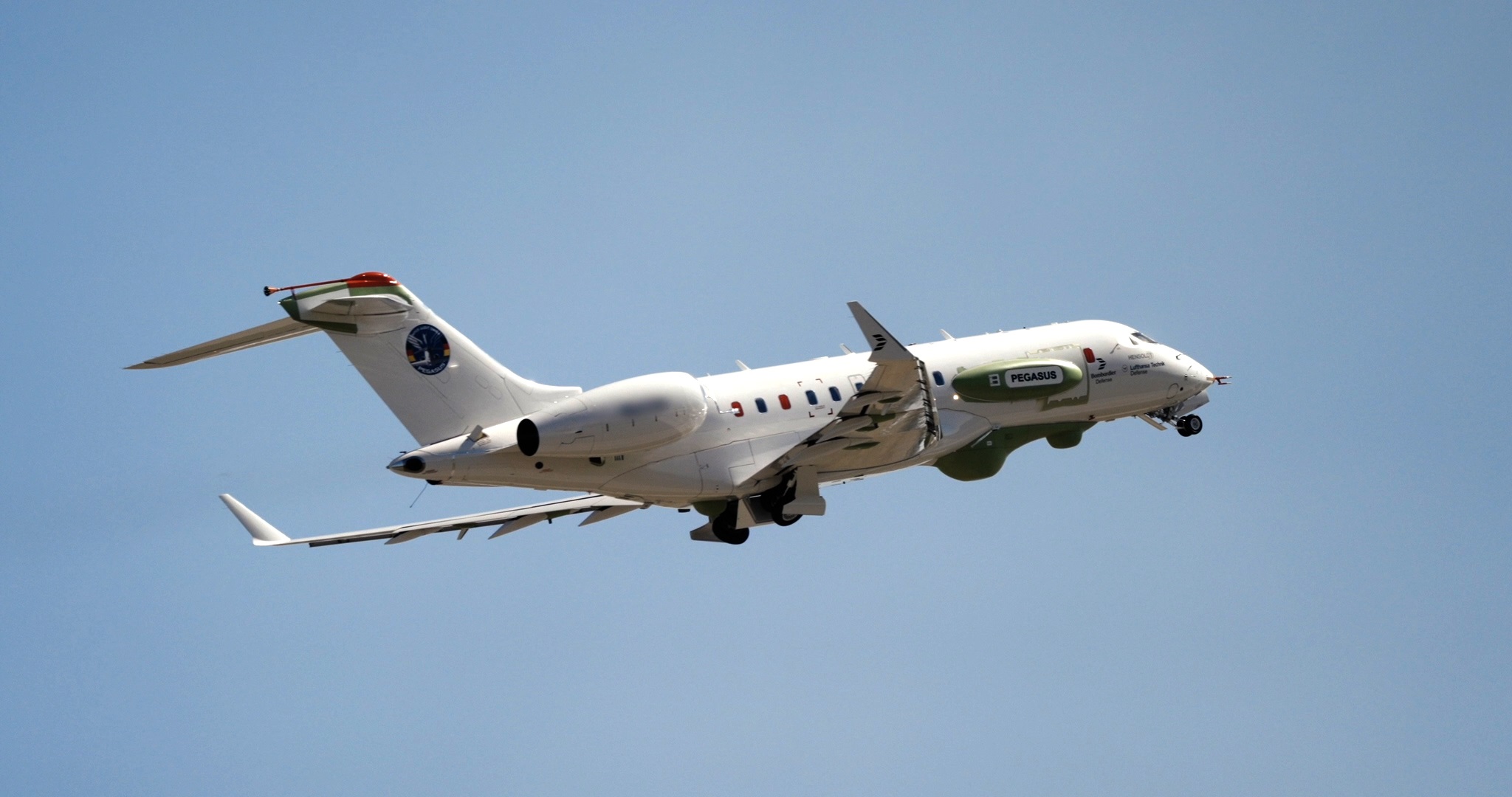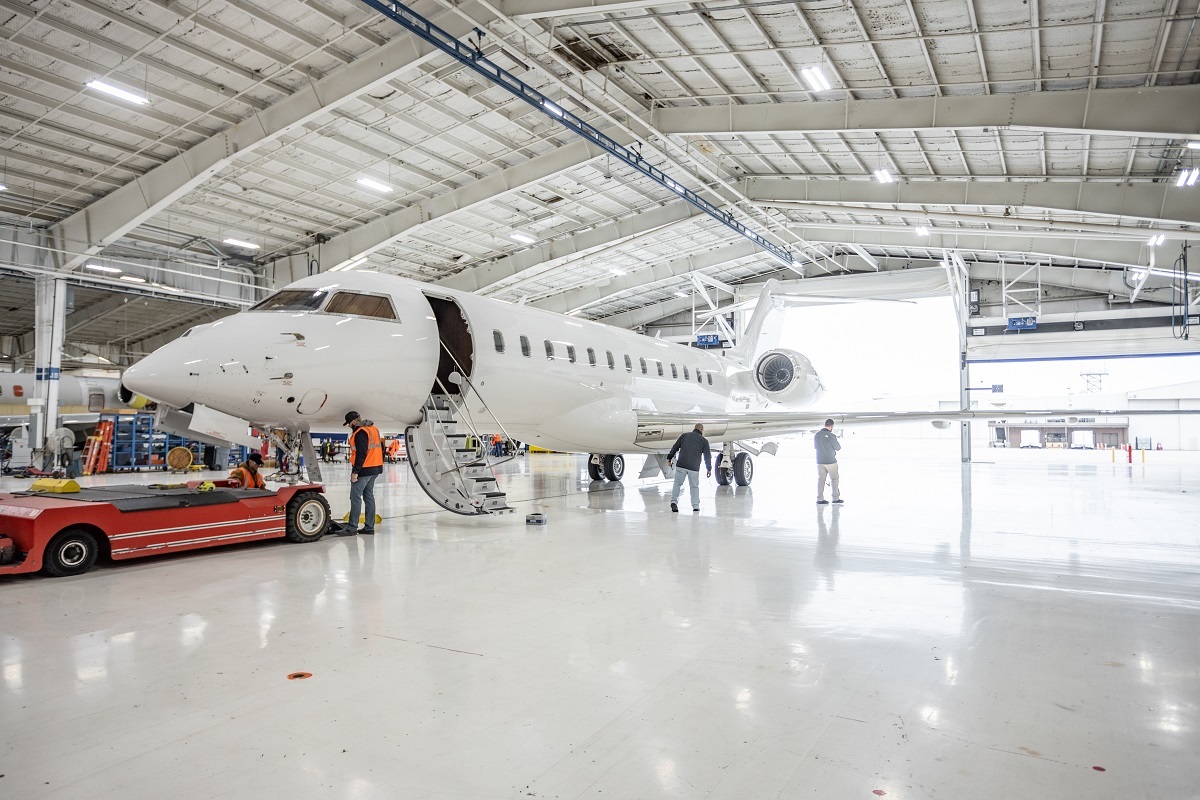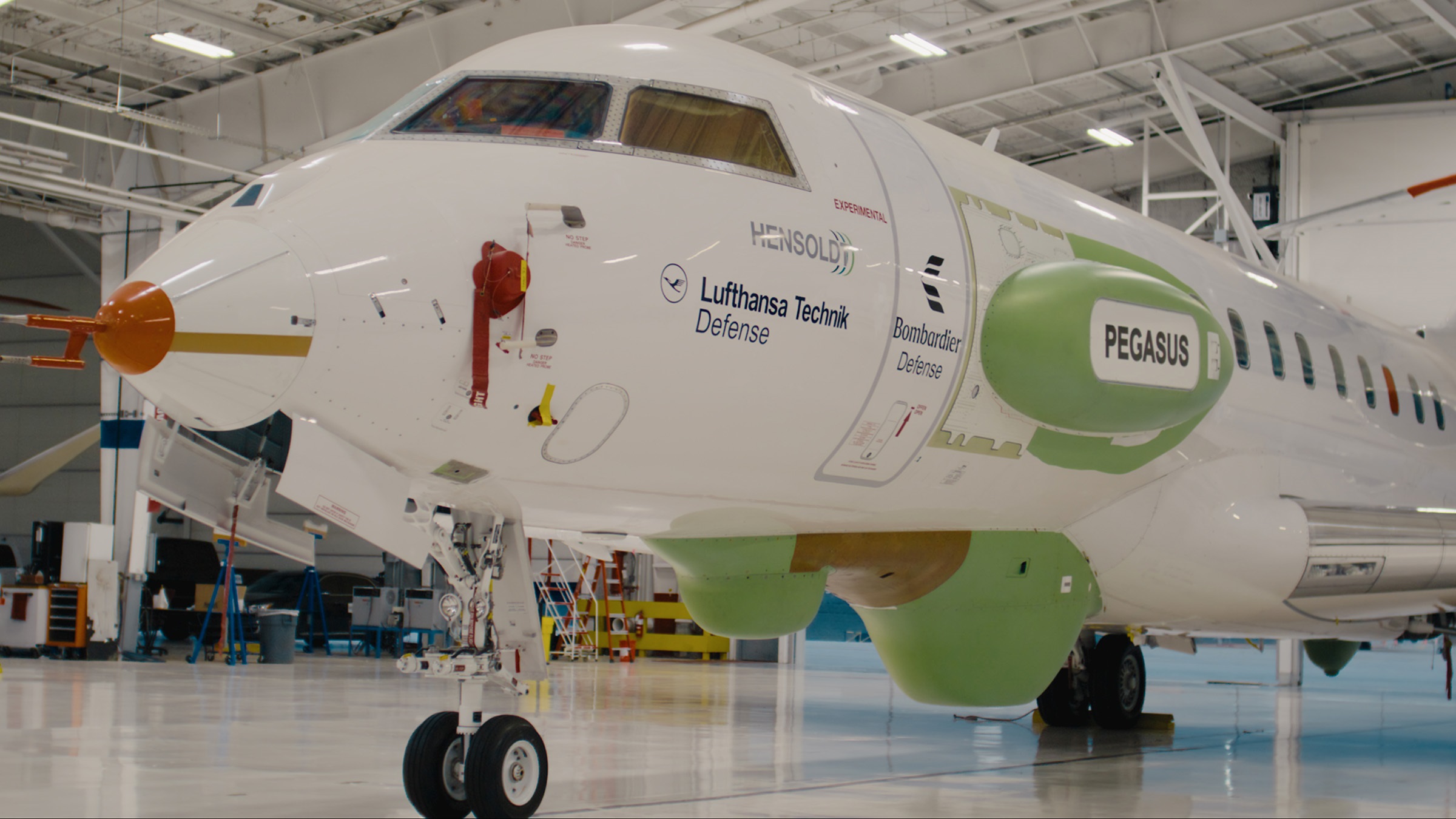


They celebrated as the Bombardier Global aircraft modified for the German armed forces’ Persistent German Airborne Surveillance System (PEGASUS) program did the maiden flight at Bombardier’s Wichita Flight Test Center.
This occasion will mark the first aircraft out of three to integrate the HENSOLDT “Kalætron Integral” signals intelligence (SIGINT) system for airborne surveillance missions is one step closer to entering service.
For now, the aircraft will remain at Bombardier’s Wichita facility for further flight testing before its upcoming systems integration and aircraft certification, to be completed by Lufthansa Technik Defense in Hamburg, Germany.
As announced, an official celebration of PEGASUS’ first flight was held in Wichita today, bringing together officials from HENSOLDT, Lufthansa Technik Defense and Bombardier Defense. This event marked the beginning of the flight testing phases for the next-generation German program.
Led by HENSOLDT, PEGASUS is an airborne missionized platform that will integrate the Kalætron Integral SIGINT system to perform highly critical signal surveillance missions for the German armed forces.
As the aircraft officially enters its next phase and is moving one step closer to the Lufthansa Technik Defense-led systems integration and certification, a celebration was held to mark the PEGASUS aircraft’s first flight.
Representatives from HENSOLDT, Lufthansa Technik and Bombardier Defense as well as representatives from the German Armed Forces traveled from Germany, Canada, and across the United States to gather in Wichita and celebrate this pivotal program milestone.
This stage of aircraft testing is conducted by the Bombardier Flight Test Centre (BFTC) team, located in Wichita, where Bombardier’s highly skilled pilots validate key aspects of the program.
These successful tests demonstrate the high capability of the Bombardier Global aircraft to complete the German air force’s critical missions. This represents a significant milestone for the first of three modified Global 6000 aircraft destined to be delivered to the German Bundeswehr.
Steve Patrick, Vice President, Bombardier Defense, said :
“Germany’s next generation signal intelligence aircraft is flying high,” “This successful first flight is the result of the strong collaboration and shared knowledge between HENSOLDT, Lufthansa Technik Defense, Bombardier Defense and our suppliers to get the modified, high-performing Global 6000 aircraft for the Pegasus program in the air."
"With flight testing regularly underway from Bombardier’s Wichita base, the aircraft continues to gather essential certification data to improve and perfect the platform before it moves to the next stage.”
Dietmar Thelen, Head of Spectrum Dominance Division at HENSOLDT, said :
“Today marks an important milestone for the PEGASUS programme,” “With the integration of our Kalætron-Integral system, we are delivering key components that are essential for the ‘reconnaissance of tomorrow’. This achievement underscores the excellent cooperation between HENSOLDT, Lufthansa Technik Defense and Bombardier Defense.”
Michael von Puttkamer, Vice President Special Aircraft Services at Lufthansa Technik, says,
“Seeing the first PEGASUS aircraft taking to the skies bearing the Lufthansa Technik Defense logo fills me with pride and also joyful anticipation, as it brings us one decisive step closer to welcoming this aircraft back at our site,”
“I’d like to congratulate and thank the outstanding Bombardier Defense team for their great performance in reaching this important project milestone, and I look forward to the upcoming flight test activities as well as the ongoing cooperation with HENSOLDT in the subsequent integration and certification of their highly sophisticated signals intelligence system.”
Until year 2019, Germany had intended to introduce four SIGINT-configured MQ-4C Tritons to fulfil this capability but decided in favour of procuring crewed aircraft instead, in part due to concerns over airspace use.
However, in June 2021, HENSOLDT was awarded the contract to supply an airborne system for electronic signals intelligence on board three Bombardier Global jets based on its Kalætron Integral system.
Since that award, HENSOLDT, Lufthansa Technik Defense and Bombardier have collaborated closely on a joint design activity. Extensive structural modification work has been performed to prepare the first aircraft at Bombardier Defense’s U.S. base in Wichita, Kansas, which houses an important contingent of the company’s experienced and skilled defense workforce. This is the site of the initial ground and flight test activities.

Upon completion of initial testing, each aircraft will be transferred to Lufthansa Technik Defense’s facilities in Hamburg for further integration work. The company is moreover responsible for the regulatory certification of PEGASUS on the overall aircraft level.
So far, Lufthansa Technik has completed its design activities for the integration of the mission system, the additional civil and military avionics systems as well as the aircraft cabin.
The production process of interior parts has also already started in order to ensure the components’ readiness for immediate installation when the aircraft arrives in Hamburg.

In the meantime, HENSOLDT has adapted the systems architecture to the operational needs of the German Bundeswehr. The corresponding hardware and software developments are currently in progress, various demonstrations have shown the immense potential and capabilities of the upcoming solution.
HENSOLDT is acting as general contractor and bears overall responsibility for the realization of the project. Lufthansa Technik Defense will act as a subcontractor, procuring the modified aircraft from Bombardier and fitting and integrating the reconnaissance system developed by HENSOLDT into the platform.
Many small and medium sized enterprises from all over Germany, Canada and the U.S. are involved in the project as part of the supply chain for all companies bringing PEGASUS to the finish line.
Source : HENSOLDT
